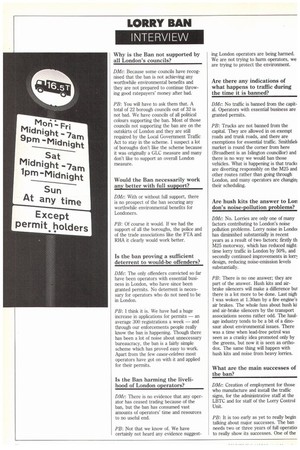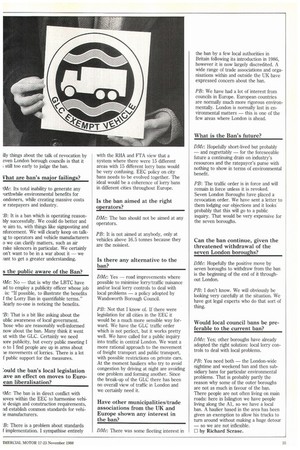Why is the Ban not supported by all London's councils?
Page 26

Page 27

If you've noticed an error in this article please click here to report it so we can fix it.
DMc: Because some councils have recognised that the ban is not achieving any worthwhile environmental benefits and they are not prepared to continue throwing good ratepayers' money after bad.
PB: You will have to ask them that. A total of 22 borough councils out of 32 is not bad. We have councils of all political colours supporting the ban. Most of those councils not supporting the ban are on the outskirts of London and they are still required by the Local Government Traffic Act to stay in the scheme. I suspect a lot of boroughs don't like the scheme because it was originally a GLC measure and many don't like to support an overall London measure.
Would the Ban necessarily work any better with full support?
DMc: With or without full support, there is no prospect of the ban securing any worthwhile environmental benefits for Londoners.
PB: Of course it would. If we had the support of all the boroughs, the police and of the trade associations like the FTA and RHA it clearly would work better.
Is the ban proving a sufficient deterrent to would-be offenders?
DMc: The only offenders convicted so far have been operators with essential business in London, who have since been granted permits. No deterrent is necessary for operators who do not need to be in London.
PB: I think it is. We have had a huge increase in applications for permits — an average 300 registrations a week — and through our enforcements people really know the ban is happening. Though there has been a lot of noise about unnecessary bureaucracy, the ban is a fairly simple scheme which has proved easy to work. Apart from the few cause-celebres most operators have got on with it and applied for their permits.
Is the Ban harming the livelihood of London operators?
DMc: There is no evidence that any operator has ceased trading because of the ban, but the ban has consumed vast amounts of operators' time and resources to no useful end.
PB: Not that we know of. We have certainly not heard any evidence suggest ing London operators are being harmed. We are not trying to harm operators, we are trying to protect the environment.
Are there any indications of what happens to traffic during the time it is banned?
DMc: No traffic is banned from the capital. Operators with essential business are granted permits.
PB: Trucks are not banned from the capital. They are allowed in on exempt roads and trunk roads, and there are exemptions for essential traffic. Smithfiell market is round the corner from here (Broadbent is an Islington councillor) and there is no way we would ban those vehicles. What is happening is that trucks are diverting responsibly on the M25 and other routes rather than going through London, and many operators are changinj their scheduling.
Are hush kits the answer to Lon don's noise-pollution problems?
DMc: No. Lorries are only one of many factors contributing to London's noise pollution problems. Lorry noise in Londoi has diminished substantially in recent years as a result of two factors; firstly th M25 motorway, which has reduced night, time lorry traffic in London by 50%, and secondly continued improvements in lorr! design, reducing noise-emission levels substantially.
PB: There is no one answer; they are part of the answer. Hush kits and airbrake silencers will make a difference bul there is a lot more to be done. Last nigh I was woken at 1.30am by a fire engine's air brakes. The whole fuss about hush ki and air-brake silencers by the transport associations seems rather odd. The haulage industry tends to be a bit of a dinosaur about environmental issues. There was a time when lead-free petrol was seen as a cranky idea promoted only by the greens, but now it is seen as orthodox. The same thing will happen with hush kits and noise from heavy lorries.
What are the main successes of the ban?
DMc: Creation of employment for those who manufacture and install the traffic signs, for the administrative staff at the LBTC and for staff of the Lorry Control Unit.
PB: It is too early as yet to really begin talking about major successes. The ban needs two or three years of full operatio to really show its successes. One of the
illy things about the talk of revocation by even London borough councils is that it ; still too early to judge the ban.
Vhat are ban's major failings?
Mc: Its total inability to generate any Forthwhile environmental benefits for ondoners, while creating massive costs nratepayers and industry.
B: It is a ban which is operating reasonbly successfully. We could do better and re aim to, with things like signposting and nforcement. We will clearly keep on talkig to operators and vehicle manufacturers
o we can clarify matters, such as air rake silencers in particular. We certainly on't want to be in a war about it — we 7ant to get a greater understanding.
s the public aware of the Ban?
Mc: No — that is why the LBTC have ad to employ a publicity officer whose job is: "If possible, to illustrate the benefits f the Lorry Ban in quantifiable terms." learly no-one is noticing the benefits.
'B: That is a bit like asking about the ublic awareness of local government. lose who are reasonably well-informed now about the ban. Many think it went ut with the GLC. Certainly we need lore publicity, but every public meeting I o to I find people are up in arms about le movements of lorries. There is a lot f public support for the measures.
;ould the ban's local legislation .ave an effect on moves to Euroean liberalisation?
Mc: The ban is in direct conflict with loves within the EEC to harmonise vehile design and construction requirements, nd establish common standards for vehile manufacturers.
B: There is a problem about standards I implementation. I sympathise entirely with the RHA and FTA view that a system where there were 15 different areas with 15 different lorry bans would be very confusing. EEC policy on city bans needs to be evolved together. The ideal would be a coherence of lorry bans in different cities throughout Europe.
Is the ban aimed at the right operators?
DMc: The ban should not be aimed at any operators.
PB: It is not aimed at anybody, only at vehicles above 16.5 tonnes because they are the noisiest.
Is there any alternative to the ban?
DMc: Yes — road improvements where possible to minimise lorry/traffic nuisance and/or local lorry controls to deal with local problems — a policy adopted by Wandsworth Borough Council.
PB: Not that I know of. If there were legislation for all cities in the EEC it would be a much more sensible way forward. We have the GLC traffic order which is not perfect, but it works pretty well. We have called for a public inquiry into traffic in central London. We want a more rational approach to the movement of freight transport and public transport, with possible restrictions on private cars. At the moment hauliers who try to avoid congestion by driving at night are avoiding one problem and forming another. Since the break-up of the GLC there has been no overall view of traffic in London and we certainly need it.
Have other municipalities/trade associations from the UK and Europe shown any interest in the ban?
DMc: There was some fleeting interest in
the ban by a few local authorities in Britain following its introduction in 1986, however it is now largely discredited. A wide range of trade associations and organisations within and outside the UK have expressed concern about the ban.
PB: We have had a lot of interest from councils in Europe. European countries are normally much more rigorous environmentally. London is normally last in environmental matters — this is one of the few areas where London is ahead.
What is the Ban's future?
DMc: Hopefully short-lived but probably — and regrettably — for the foreseeable future a continuing drain on industry's resources and the ratepayer's purse with nothing to show in terms of environmental benefit.
PB: The traffic order is in force and will remain in force unless it is revoked. Seven London Boroughs have placed a revocation order. We have sent a letter to them lodging our objections and it looks' probably that this will go to a public inquiry. That would be very expensive for the seven boroughs.
Can the ban continue, given the threatened withdrawal of the seven London boroughs?
DMc: Hopefully the positive move by seven boroughs to withdraw from the ban is the beginning of the end of it throughout London.
PB: I don't know. We will obviously be looking very carefully at the situation. We have got legal experts who do that sort of thing.
Would local council bans be preferable to the current ban?
DMc: Yes; other boroughs have already adopted the right solution: local lorry controls to deal with local problems.
PB: You need both — the London-wide nightirne and weekend ban and then subsidiary bans for particular environmental problems. That is probably partly the reason why some of the outer boroughs are not as much in favour of the ban. There people are not often living on main roads: here in Islington we have people living along the Al, so we have a local ban. A haulier based in the area has been given an exemption to allow his trucks to turn around without making a huge detour — so we are not inflexible.
0 by Richard Scrase.


























































